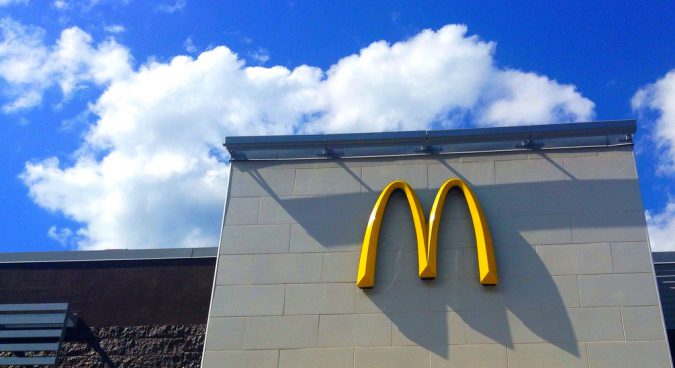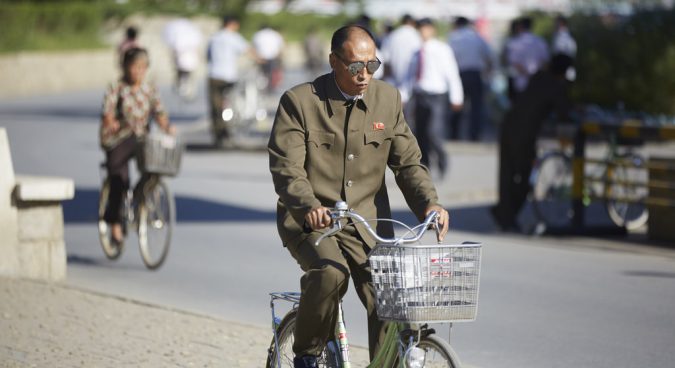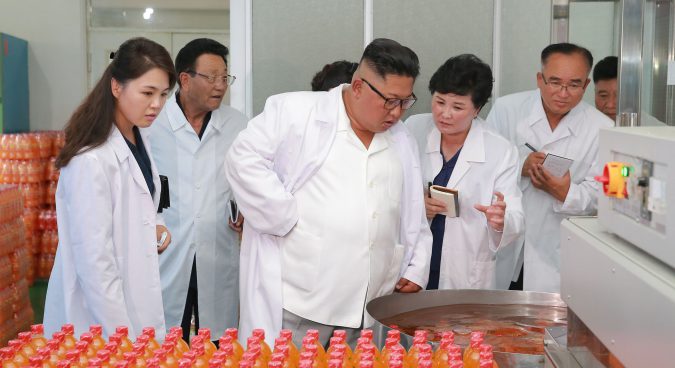Yet, North Korea has a thriving private sector, and private entrepreneurs manage and finance much of what on paper are goods and services made by state-owned enterprises (SOEs).
Private entrepreneurs in North Korea are franchisees of SOEs and state institutions. They make deals with local government (people’s committees) to open restaurants, using the local government’s name as their “brand.” They need it to protect them from the police and provide a legal cover.
But many other businesses in North Korea that operate outside people’s homes and outside formal marketplaces also make use of similar schemes.
Thinking of them as franchises of state agencies and SOEs helps us better understand this relationship: entrepreneurs purchase the right to use the name of a state entity, they usually a portion of the share the profits, and the state entity’s ‘trademark’ keeps them out of prison.
It’s like McDonald’s, if the Golden Arches held monopoly rights on the production of all goods and services in the United States.
COSTS OF CASH
North Korean GDP is a bit larger than the McDonald’s Corporation’s global revenues. But at USD$24 billion, Mickey D’s is not so far behind the DPRK’s estimated USD$32 billion. McDonald’s is a far more successful corporation than the DPRK government, yet with all its success, it has stuck to a model of business organization: the franchise.
Headquarters in Chicago could probably secure the funds to gradually buy out all of its franchisees, if they so wished, but they don’t. The franchise model works for a number of reasons, but one is that it spreads risk – franchisees pony up the cash for their location, for the restaurant’s supplies, fixtures, equipment, for staff recruitment and much else besides.

Franchisees are great for the company as a source of ideas and local knowledge about local markets | Photo by JeepersMedia
Franchisees take huge risks, they are often highly dedicated people who are prepared to invest a great deal of their own money. Their devotion can make them very successful, but from the perspective of McDonald’s sales executives, it’s very useful for another reason: franchisees are a cheap source of capital and a cheap way to grow the business.
Borrowing money and taking the risk, even if you are a big, diversified corporation like McDonald’s, is unnecessary, if you have a pool of would-be entrepreneurs prepared to take the risks and do the work for you. The same goes for restaurants, fishermen, bus companies, and even garment factories in North Korea.
FINDING THE RIGHT LOCATION
McDonald’s is a very rich corporation, but even it does not have perfect information. Indeed, franchisees are great for the company as a source of ideas and local knowledge about local markets. As economists sometimes say, franchisees help franchisors cut down on ‘search costs’ – i.e. the costs of finding and exploiting business opportunities. Not only do they bear most of the risks, but they find the ways to make profits.
Obviously, North Korea’s many private restaurants serve as a good example here, as do private markets.
But another interesting example is North Korea’s foreign trade bureaucracy. Since the late 1980s, North Korea’s foreign trade company network has come to resemble the Ray Kroc restaurant empire in a number of ways.
North Korean trade companies come under powerful state, military, or party agencies. They often have rights to particular sites – mines, forests, farms, areas where certain commodities like mushrooms are found in large quantities etc.
Trade companies when they are created don’t necessarily have the funds or expertise to exploit these opportunities. They need to hire workers, but they may also need to find marketing opportunities. Instead of going to all the bother trying to do all this internally, at head office, many a trade company will create autonomous branches that use the ‘brand’, make use of the ‘business model’, and pay a share of the profits to head office, but have operational independence.
A businessperson will head the branch, buy the equipment, find the workers, and then get to work extracting the coal, or the gold, gathering the mushrooms, or send the boats out to sea in search of fish. They will have state bank accounts and be expected to use the state business model – giving their workers rations, holding regular Party cell meetings et al.
McDonald’s franchise agreements will require franchisees to decorate their locations in a certain way, and ensure a uniform taste. North Korea’s foreign trade enterprises will require that their branch managers keep up state appearances and abide by at least some of the government’s rules and regulations.
In return, McDonald’s gets a ready pool of entrepreneurial talent to exploit local markets to the full. Similarly, North Korea’s foreign trade enterprises bring in businesspeople as quasi-independent branch managers to provide funds, but also business acumen and connections in foreign markets.

Many North Korean officials have no idea how to run a business | Photo by nknews_hq
MANAGING THE MANAGERS
Finally, the Golden Arches explains another reason why private enterprise has become a part of North Korea’s ‘state’ economy: managers face limited incentive to work hard – promotion prospects and bonuses are key in a lot of situations.
North Korea under Kim Il Sung was an economic system that prized political loyalty over profit, and inside the corridors of power, loyalty appears to remain highly important.
However, when it comes to making money, both private businesspeople and their state patrons have good reason to opt for franchise-like business arrangements.
Many North Korean officials have no idea how to run a business, have no money to do so, and also have no idea how to assess whether a business is being run well, and how much money it is making. North Korea is a very corrupt country, and plenty of sales are handled in cash.
Of course, state agencies and trade companies may require their ‘franchisees’ to use their ‘business model’. To have company bank accounts and also be audited regularly. But rest assured, North Korean businesspeople find ways to evade taxes.
To minimize what economists call ‘monitoring costs’ – that is, the cost of checking to see whether your business associates are being honest – the North Korean government often just requires that SOEs pay a certain amount of money to the central/local government on a quarterly basis (so-called ‘cash plans’).
By the same token, North Korean business people are often just required to do the same when they set up ‘state franchises’.
In a way, this is a bastardized version of McDonald’s franchise agreement, with its requirement that franchisees pay a fixed percentage of revenues to the company. It’s a cheap way to ensure that the company gets a relatively risk-free source of revenue – and potentially a source of business talent.
Source:.nknews.org



